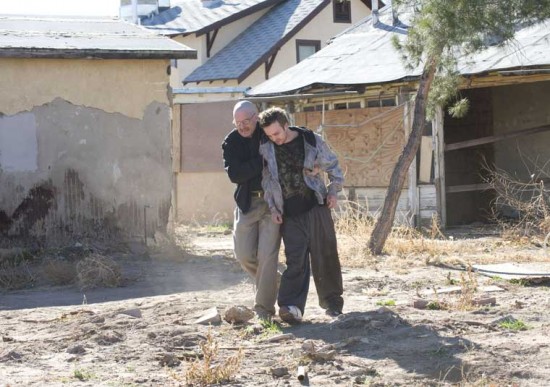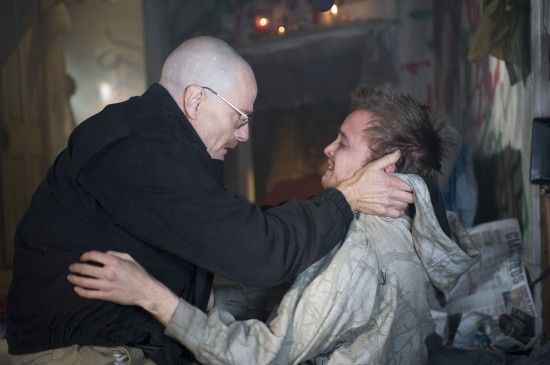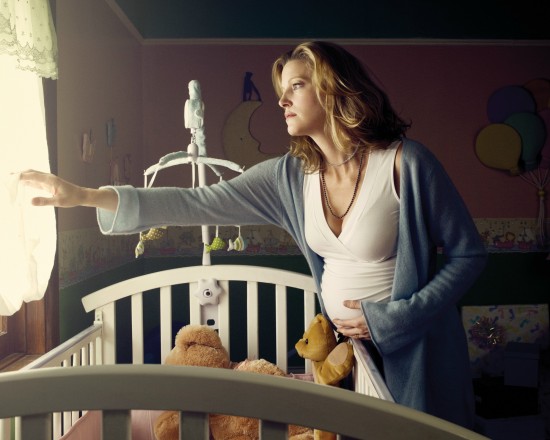Breaking Bad's Season Finale "ABQ" Gives Ridiculous New Meaning To The Words "Left Behind." Body Bags, Secret Codes, And The Teddy Bear Discussed.
For Hunter's reviews/wrap-ups of the previous two episodes of Breaking Bad leading up to last Sunday's divisive finale, click here for ep 11 ("Mandala") and here for ep 12 ("Phoenix").
Now that most everyone has caught up with the season finale of Breaking Bad, entitled "ABQ," on their TiVo and what not, let's take a look at what went...down. Actually, for the sake of disclosure, the mini-delay of this write-up is also due to the episode being a surprising disappointment in my eyes. For a series that is deftly founded on madcap realism, the natural awes of science, and the odds of consequence, I found "ABQ" to stretch way beyond the show's established believability (and viewers' trust therein).
Spoiler Alert from this point forward: While the ending to "ABQ" finally revealed the cause of the body bags and the doom-laden destruction at the Whites' residence that we've gleaned all season long, it steered far, far away from fans' countless predictions. Not a single commenter on /Film guessed that the ending would carry a strange, ill-fitting religious twist; complete with fire-and-brimstone imagery that instantly reminded me of those ludicrous Left Behind books. Yuck. That said, perhaps the only remaining loose-end from the finale is the pink teddy bear. You may recall that the stuffed bear appeared in the previous episode, "Phoenix," during a drug transaction and yet it inexplicably appears here floating in Walt White's pool. (This being an ominous image that was teased all season long.) There is no logical explanation. And don't worry, there officially isn't one. As you'll read, a higher power most likely placed it there as a humorous cherry atop a vengeful sundae of "You're F***ed, Walt." Satisfying? Not at all.
I was curious to hear if the loud Biblical-like doom and destruction at the end of the finale was intentional. Maybe I was misinterpreting it, or over-analyzing a TV show that is stocked with talented writers who make sport of clever subtext. Thankfully, the show's brilliant mastermind, Vince Gilligan, has been quite vocal about the finale. Unfortunately, he confirmed that what Walt encountered at season's end was indeed "the wrath of God raining down," or "Lucifer ex machina, 'Devil from the machine'—it's the opposite of [deus ex machina]. It almost could feel kind of random, but it's not." So, in the name of bad puns, Walt White wasn't blinded by science at the end. No, in his world, the one Gilligan created, there are still bigger forces at play, like divine predestination. In Gilligan's words, two airliners exploding over Walt's head was no less than a "cosmic indictment" of his life's misdirection. Jesse Pinkman, go ahead, say it: "Yo!"

In Season Two—which, outside of Sunday's finale, made for some of the greatest TV I've ever seen—I had previously noticed scenes with religious undertones and imagery. This was most notable and visible in episode nine, entitled "4 Days Out." That fantastic ep found Walt White and Jesse Pinkman stranded in their mobile meth lab in the desert, suffering from dehydration and hunger. Jesse finally broke down over the steering wheel and began to quietly pray. If memory serves, he began to tear-up and apologize for wrongs he had committed. Jesse's youthful regret was tinged with a real, mortal fear that most men only experience much later in life. And of course, there was nothing wrong with Jesse praying. But until this scene we had no reason to believe that Jesse (or the show itself) was religious.
This scene added another layer to Jesse, a character that had not only fallen on hard times (he was completely broke, car-less, and homeless), but had literally fallen into s*** and piss (porta-potty, episode four, "Down," gross). In a later episode this season, Jesse, again under pressure, clasped his hoodied-arms together to pray at the kitchen counter in his apartment. Maybe he chose to pray there because he thought his bong might serve as an intergalactic antenna. But as the stakes got higher to match the widening scope of Jesse and Walt's drug business, I wondered if the role of "faith" and a forced notion of THE all-seeing eye would also become greater. I really, really hoped it would not go in that direction. With the DEA, competing dealers and organizations, and impossible amounts of stress gaining on Walt White, the show had no reason to bring a god into it. Alas, Gilligan's explanation of the finale has given me pause. I'm left wondering if Breaking Bad was planned as a religious allegory; an overconfident man of science and math testing reality to such an extent that a higher power steps in and serves him up. I mean, the inclusion of an all-seeing eye belonging to a god might even put Saul Goodman out of business. The horror.
To Hit or Not To Hit Audiences and Walt Over the Head
In my write-up of "Phoenix," the parallels between Jesse's girlfriend, Jane Margolis, and Walt's new baby daughter, Holly, were discussed. To reiterate, in "Phoenix" Walt is shown placing Holly onto her side like a loving parent. Later on, after Walt unknowingly and randomly encounters Jane's father, Donald, at a bar, Walt asks his advice on how to raise a daughter. Donald, having just dealt with Jane's latest and last relapse, offers a friendly shrug. Minutes later, Walt is standing over Jane as she chokes in her sleep on heroin-induced vomit, after he indirectly caused her to roll onto her back. If Walt had helped Jane by placing her on her side she likely would have survived. In his Q&A with viewers, Gilligan described the aforementioned parallels between Jane and Holly in "Phoenix" with this: "Those are the kinds of moments that you want to be subtle enough that they don't hit you over the head. ...There's an idea there of the cycle of life. And it just seemed like a cool thing to do."
But this sentiment doesn't gel with "ABQ"—an episode that was uncharacteristically drenched in borderline melodrama. Here, the parallels-of-life between Holly and Jane are incredibly heavy-handed. After Jane's father (actor John de Lancie) lays out Jane's funeral dress on her bed, sleeves extended at the side to form a cross-like image, we cut to Holly, lying down with her arms extended out just the same. Geezus, we get it. In regards to Gilligan's concern for beating us "over-the-head," perhaps he should have better listened to Hank's glorious speech about "wack-a-mole" in this ep. Because the whole beating-Walt-over-the-head-with-two-air-liners thing was even harder to swallow. It's a bleak and ridiculous "cosmic" twist on par with a doctor—distraught over a dead daughter caught in mob crossfire—accidentally replacing Tony Soprano's heart with an ape's. And after Walt and Donald's random if not far-fetched encounter in "Phoenix," the culminating disaster is so fatalistically ludicrous so as to put their previous crossing of paths under a bulls*** lamp. Feel free to disagree in the comments, or debate me directly on Twitter.
 Jesse, Mike The Fixer, and the Post-Apocalyptic Ruins of Meth Country
Jesse, Mike The Fixer, and the Post-Apocalyptic Ruins of Meth Country
While /Film was way off on predicting the bodies in the bodybags—re: passengers from the air-collision—we were close to being on the money about how Jesse and Walt would deal with Jane's death. The episode opens with bouncing bed springs. Tasteful. Jesse is attempting to resuscitate Jane to no avail. Yep, so Jesse calls Walt who "calls Saul." And Saul sends over a "fixer" or "a cleaner" a la Harvey Keitel's Winston "The Wolf" in Pulp Fiction. As played by veteran actor, Jonathan Banks, Mike the Fixer is just as mysterious, professional, unmoved, and surprisingly likable as we could ever hope for a character in this line of work. (It would be great to see the character have a larger role in Season 3.) Mike drives to Jesse's apartment and calmly yet briskly disposes of the needles, including the one Walt touched, in Jesse's bedroom, and then confiscates Jesse's bong and money (until the dust settles). He tells a shaken, disoriented Jesse to cover up his track marks, call 9-1-1 and play dumb. Tells him he's almost in "the home stretch." Jesse does what Mike says. "Playing dumb" is sadly not much of a stretch in his current state.
As we have come to expect, Jesse enters a druggy haze as he mourns the loss of his girlfriend. Walt has to call Mike to track Jesse down. They find Jesse strung out on heroin in a shanty-town of drug dens. These scenes, in which Walt walks up to and enters this drug zone, almost feel torn out of a post-apocalyptic sci-fi horror movie. Meth users stare eerily at, er, through, Walt like nocturnal, tribal-tatted zombies. He's visibly unsettled by them, like a mad scientist seeing his creations in daylight. Once Walt finds him, Jesse (Aaron Paul) begins to sob uncontrollably, blaming himself and professing his love for Jane. To be honest, rather than strike up any real emotion, I found this scene to be overdone, as if bobbing for Emmys; moreover I found Jesse, my favorite character, pathetic.
Walt takes Jesse to a posh facility that looks like a tepee spa—note: shot lingering on the sky opening—straight out of Entourage. (I believe Walt mentions this kooky place in Season One per his cancer treatment/newfound ability to lie to his wife?) For now, Jesse seems safe, able to sweat, think, and mourn out a lot of the dread and anxiety plaguing him throughout the season. It's here that most viewers knew Jesse wouldn't end up in one of the body bags. A little relief.
 Skyler Don't Play That
Skyler Don't Play That
Before the sky erupts into flame directly over Walt's head, he is left behind by his family. While in the hospital awaiting surgery (successful), Walt is hopped up on pain killers and groggily reveals to Sklyer (and an ever-doting Walt Jr.) that he does indeed own two cell phones. Hell hath no fury. All season long, we've anticipated Skyler cheating on Walt with her corrupt former and current boss Ted Beneke. She hasn't, and I think this was a great creative decision. Of the show's adults, Skyler remains the most morally upstanding, and in a TV landscape where ladies (and men) are increasingly promiscuous, the character, as played by Anna Gunn, remained strong and independent without sinking to Walt's lows and appetite for power, selfishness, and lies.
An undetermined amount of time has passed since Walt's surgery (he now has an unfetching fuzz on his chin). Skyler confronts Walt as she hastily packs. She's leaving him to stay indefinitely with Hank and her sister. Skyler tells him that she knows about the two phones; she also reveals to Walt that he's paid for his cancer treatments in full without assistance (but she knows not how he did this, which has to be maddening given the sum). She also knows that Walt never visited his mother (whom we haven't met). Moreover, his mother didn't even know Walt had cancer (but now she seemingly does; that has to hurt).
If it wasn't for the birth of Holly, a divorce might be inevitable. Walt's deceit and secrecy this season has reached its limit, and in one of the best scenes all season, Skyler tells Walt that she no longer wants to know. She's scared to know the truth. The truth is, she doesn't know her husband or the father of her children at all. This season, the relationship between Walt and Skyler has been dreadfully cold—maybe a handful of kisses and pecks total. We have no idea how they will reconcile and, with two more seasons to go (at least), they will almost have to form a Bonnie and Clyde partnership to make it work.
Gus, the DEA, and Not S***ting Where You Eat (But Tipping Graciously)
When Gus Frings (actor Giancarlo Esposito) shows up for a tour of the DEA's offices in "ABQ," complete with an "insider" peptalk with Hank, the body bags might as well have flashed on screen like a subliminal message: Skyler and Walt Jr. dead on their lawn. Gus places cash in Walt's donation jar and eerily chums it up with his brother-in-law. It's a false alarm of course, albeit a chilling one, because Gus is far too careful to order such an explosion of violence on a public level. That said, at this point, we still don't know enough about this character to gauge whether he'd ever kill an innocent woman and a teenager. Gilligan offers us a further glimpse into Gus's mindset in an interview with TV critic Alan Sepinwall: "[Gus] would never have gotten into business with Walt in the first place without doing due diligence: 'Oh, he's a high school chemistry teacher, he has a brother-in-law in the DEA,' etc. In my mind, Gus would be less than he is if he was to be surprised by that." So, Gus already knew about Walt's cancer and his familial ties to the authorities. But does Walt know he knows?
Jane's Father, His Job, Jane's Death, Hidden Title Codes, and a "Disaster" in the Sky
Jane's father pulls up to her and Jesse's apartment complex and through his windshield sees paramedics rolling out an empty stretcher. The general viewer readies for a loud and heartbreaking reaction. But John de Lancie plays it realistically and against expectation. He enters the apartment, stares down at his dead daughter on Jesse's bed, and walks through police protocol and out the front door as if it were a dream he's walked through a thousand times. Given his air of defeat and sleepless nights, he no doubt has. However, even Jesse, in his current goner-state, seems perplexed by Donald's calmness. They don't speak and barely acknowledge one another. And in a way, Jesse's loss seems trivial, overly romanticized and magnified by drug abuse, in a room with Jane's father.
After Donald returns to work a co-worker awkwardly offers his by-the-number condolences in the office kitchen. Donald still has that mile-long stare of sadness. Of course, we find out soon thereafter that Donald is employed as an air-traffic controller. Uh oh. "ABQ" is the abbreviation for Albuquerque Airport. In fact, if you chronogically combine the titles of certain episodes this season you get: "Seven Thirty-Seven" "Down" "Over" "ABQ."
I'm not sure what the procedure is for returning to Donald's specific job after a loss in the family et al, but I found it too hard to believe that he would go completely unsupervised. The responsibilities are far too great. I've taken similar leaps with Breaking Bad before—like when Walt "suddenly" popped up alongside Hank's vehicle while he was staking-out Heisenberg—but not this time.
We see the planes moving closer circa '80s tech-dramas, surrounded in red warning circles, on Donald's computer screen. Walt is indirectly the source of this disaster, the cause of the deaths of an untold number of innocent people. In my opinion, this is just a really poor, outlandish and cartoonish Faustian example of global (and karmic) connectedness; how our worst decisions and actions come back to bite us. Earlier in the ep, Hank points to a map showing Heisenberg's meth spreading like wild fire in surrounding states. New Mexico is now curiously short of "The Blue Stuff." With Gus's distribution, Walt is creating an entire mid-west of high-grade junkies. The "hotness" on Hank's map is moving slowly outward, but it's even more deadly than the red circles in front of Donald's shifting eyes. The message and theme of connectedness was already being executed perfectly without an exclamation point that conjures religion, god, "cosmic indictment," fate and 9/11.
The ending also makes all of the teasing throughout the season kind of pointless. Fans are rewarded with a complete psych-out. Even though the pink teddy bear appeared in "Phoenix," Gilligan says it's, "Just a little Easter Egg for the people who notice things on that level." He goes on to compare the bear's appearence in "Phoenix" to Where's Waldo. If Gilligan is looking for disappointed and semi-angry fans after his finale's conclusion, I don't think he'll need to squint to find at least a few. Moreover, if Gilligan is headed in an inherently religious direction with Breaking Bad, perhaps he should have countered David Chase's infamous cut-to-black with a cut-to-blinding-light.
Breaking Bad airs Sundays at 10 p.m. ET/PT on AMC.Hunter Stephenson can be reached at h.attila[at]gmail.com and on Twitter.
